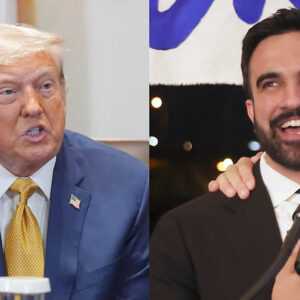President Donald Trump dropped the ax on some top members of his national security team after a meeting with investigative journalist Laura Loomer earlier this week.
National Security Agency Director Army Gen. Timothy Haugh and civilian Deputy Director Wendy Noble were among those who were fired by the president, a senior official said to Fox News.
Haugh was also removed from his post as commander of the U.S. Cyber Command while Noble was reassigned to a new job in the office of the undersecretary of defense for intelligence.
Connecticut Rep. Jim Himes, the top Democrat on the House Intelligence Committee, criticized the president’s decision.
“I have known General Haugh to be an honest and forthright leader who followed the law and put national security first—I fear those are precisely the qualities that could lead to his firing in this Administration,” he complained.
Himes further demanded that the House Intelligence Committee and the public be given “an immediate explanation for this decision, which makes all of us less safe.”
Sen. Mark Warner, the top Democrat on the Senate Intelligence Committee, was also apoplectic when he heard the news.
“General Haugh has served our country in uniform, with honor and distinction, for more than 30 years. At a time when the United States is facing unprecedented cyber threats, as the Salt Typhoon cyberattack from China has so clearly underscored, how does firing him make Americans any safer?” he said on X.
“It is astonishing that President Trump would fire the nonpartisan, experienced leader of the NSA while still failing to hold any member of his team accountable for leaking classified information on a commercial messaging app – even as he apparently takes staffing direction on national security from a discredited conspiracy theorist in the Oval Office,” he said in another post.
Still, during Trump’s first term, several members of the National Security Council were suspected of undermining him and his ability to conduct foreign policy. That included leaks to the media, as well as one by then-Lt. Col. Eugene Vindman, now a Democratic lawmaker from Virginia, whose ‘quid pro quo’ claim regarding Ukraine led to Trump’s first impeachment.
Earlier this month, a federal district judge in Washington, D.C., ruled that Trump’s dismissal of the head of the Office of Special Counsel was unlawful, allowing him to remain in his position at least for the time being. The Trump administration promptly filed a notice of appeal, Fox News reported.
Hampton Dellinger, appointed by former President Joe Biden to lead the Office of Special Counsel, sued the Trump administration following his dismissal on February 7. In her ruling, D.C. District Judge Amy Berman Jackson stated that the decision to deem Dellinger’s firing “unlawful” aligns with Supreme Court precedent.
Jackson wrote that the court “finds that the elimination of the restrictions on plaintiff’s removal would be fatal to the defining and essential feature of the Office of Special Counsel as it was conceived by Congress and signed into law by the President: its independence. The Court concludes that they must stand.”
Jackson issued an injunction against the defendants in the case, including Russ Vought, Director of the United States Office of Management and Budget, and Treasury Secretary Scott Bessent, directing them to recognize Dellinger’s position.
“It would be ironic, to say the least, and inimical to the ends furthered by the statute if the Special Counsel himself could be chilled in his work by fear of arbitrary or partisan removal,” Jackson wrote.
The judge further noted in her order that the enjoined defendants “must not obstruct or interfere with his performance of his duties; they must not deny him the authority, benefits, or resources of his office; they must not recognize any Acting Special Counsel in his place; and they must not treat him in any way as if he has been removed, or recognize any other person as Special Counsel or as the head of the Office of Special Counsel, unless and until he is removed from office” in accordance with the statute defining Dellinger’s post.
Jackson’s ruling follows the Supreme Court’s decision to halt the Trump administration’s attempt to remove Dellinger. The administration had sought to overturn a lower court’s temporary reinstatement of the special counsel.





